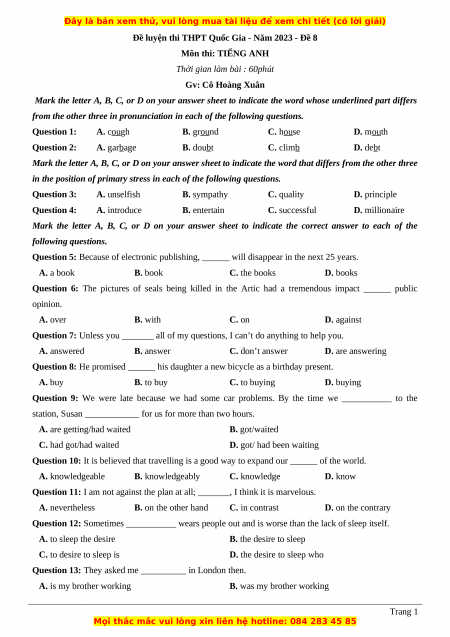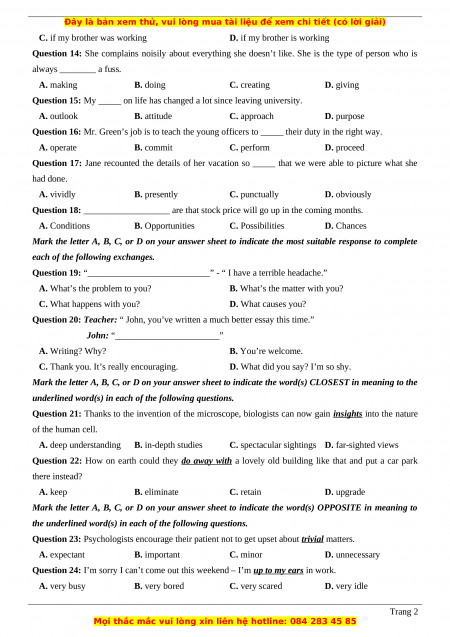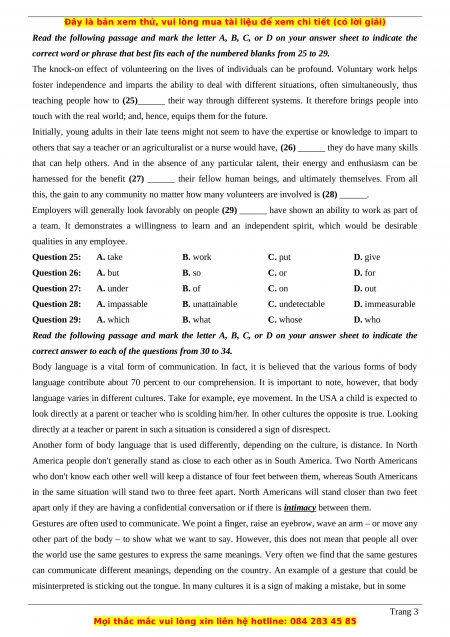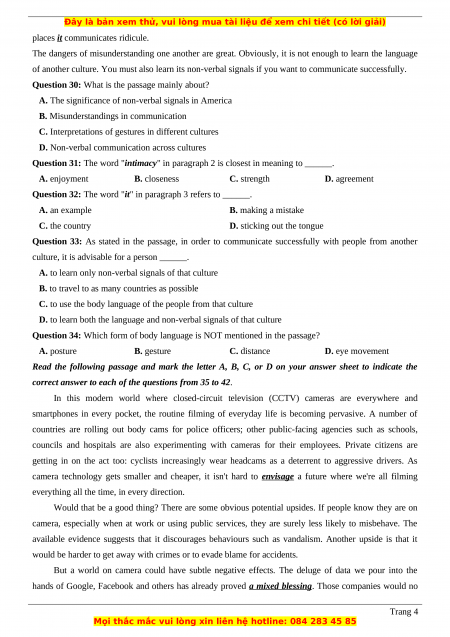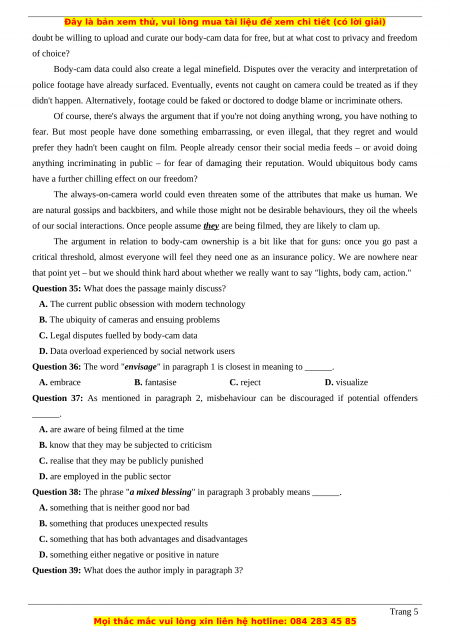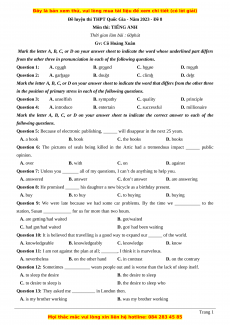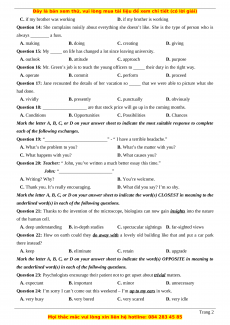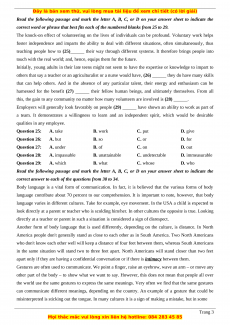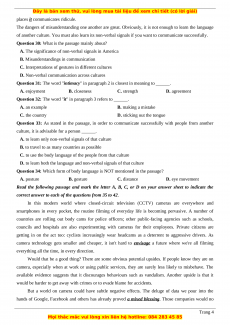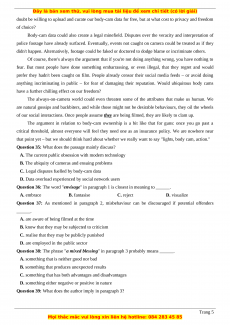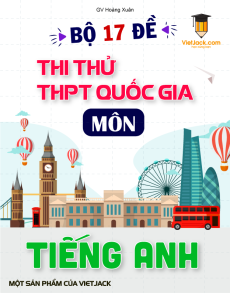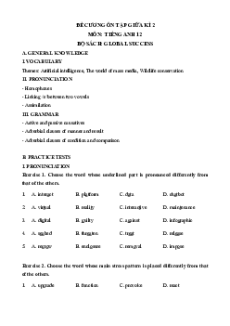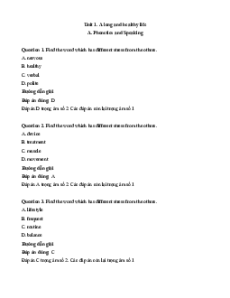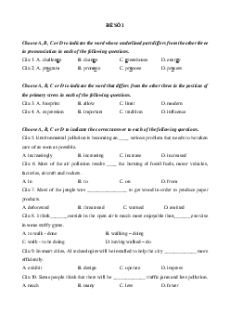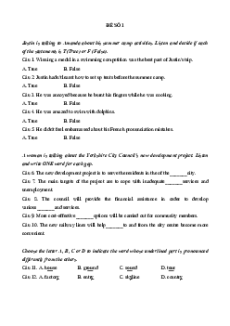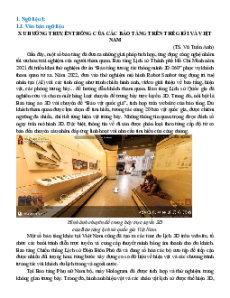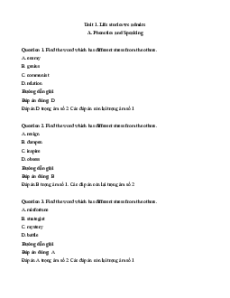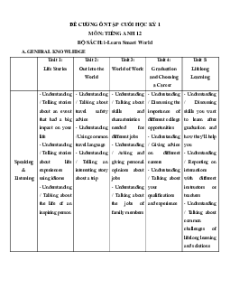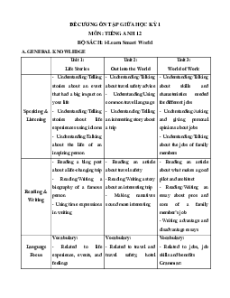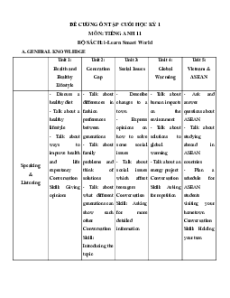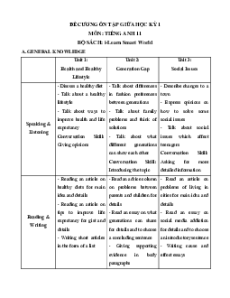Đề luyện thi THPT Quốc Gia - Năm 2023 - Đề 8 Môn thi: TIẾNG ANH
Thời gian làm bài : 60phút Gv: Cô Hoàng Xuân
Mark the letter A, B, C, or D on your answer sheet to indicate the word whose underlined part differs
from the other three in pronunciation in each of the following questions. Question 1: A. cough B. ground C. house D. mouth Question 2: A. garbage B. doubt C. climb D. debt
Mark the letter A, B, C, or D on your answer sheet to indicate the word that differs from the other three
in the position of primary stress in each of the following questions. Question 3: A. unselfish B. sympathy C. quality D. principle Question 4: A. introduce B. entertain C. successful D. millionaire
Mark the letter A, B, C, or D on your answer sheet to indicate the correct answer to each of the
following questions.
Question 5: Because of electronic publishing, ______ will disappear in the next 25 years. A. a book B. book C. the books D. books
Question 6: The pictures of seals being killed in the Artic had a tremendous impact ______ public opinion. A. over B. with C. on D. against
Question 7: Unless you _______ all of my questions, I can’t do anything to help you. A. answered B. answer C. don’t answer D. are answering
Question 8: He promised ______ his daughter a new bicycle as a birthday present. A. buy B. to buy C. to buying D. buying
Question 9: We were late because we had some car problems. By the time we ___________ to the
station, Susan ____________ for us for more than two hours.
A. are getting/had waited B. got/waited C. had got/had waited
D. got/ had been waiting
Question 10: It is believed that travelling is a good way to expand our ______ of the world. A. knowledgeable B. knowledgeably C. knowledge D. know
Question 11: I am not against the plan at all; _______, I think it is marvelous. A. nevertheless B. on the other hand C. in contrast D. on the contrary
Question 12: Sometimes ___________ wears people out and is worse than the lack of sleep itself. A. to sleep the desire B. the desire to sleep
C. to desire to sleep is
D. the desire to sleep who
Question 13: They asked me __________ in London then.
A. is my brother working
B. was my brother working Trang 1
C. if my brother was working
D. if my brother is working
Question 14: She complains noisily about everything she doesn’t like. She is the type of person who is always ________ a fuss. A. making B. doing C. creating D. giving
Question 15: My _____ on life has changed a lot since leaving university. A. outlook B. attitude C. approach D. purpose
Question 16: Mr. Green’s job is to teach the young officers to _____ their duty in the right way. A. operate B. commit C. perform D. proceed
Question 17: Jane recounted the details of her vacation so _____ that we were able to picture what she had done. A. vividly B. presently C. punctually D. obviously
Question 18: ___________________ are that stock price will go up in the coming months. A. Conditions B. Opportunities C. Possibilities D. Chances
Mark the letter A, B, C, or D on your answer sheet to indicate the most suitable response to complete
each of the following exchanges.
Question 19: “___________________________” - “ I have a terrible headache.”
A. What’s the problem to you?
B. What’s the matter with you?
C. What happens with you? D. What causes you?
Question 20: Teacher: “ John, you’ve written a much better essay this time.”
John: “_______________________” A. Writing? Why? B. You’re welcome.
C. Thank you. It’s really encouraging.
D. What did you say? I’m so shy.
Mark the letter A, B, C, or D on your answer sheet to indicate the word(s) CLOSEST in meaning to the
underlined word(s) in each of the following questions.
Question 21: Thanks to the invention of the microscope, biologists can now gain insights into the nature of the human cell. A. deep understanding B. in-depth studies
C. spectacular sightings D. far-sighted views
Question 22: How on earth could they do away with a lovely old building like that and put a car park there instead? A. keep B. eliminate C. retain D. upgrade
Mark the letter A, B, C, or D on your answer sheet to indicate the word(s) OPPOSITE in meaning to
the underlined word(s) in each of the following questions.
Question 23: Psychologists encourage their patient not to get upset about trivial matters. A. expectant B. important C. minor D. unnecessary
Question 24: I’m sorry I can’t come out this weekend – I’m up to my ears in work. A. very busy B. very bored C. very scared D. very idle Trang 2
Read the following passage and mark the letter A, B, C, or D on your answer sheet to indicate the
correct word or phrase that best fits each of the numbered blanks from 25 to 29.
The knock-on effect of volunteering on the lives of individuals can be profound. Voluntary work helps
foster independence and imparts the ability to deal with different situations, often simultaneously, thus
teaching people how to (25)______ their way through different systems. It therefore brings people into
touch with the real world; and, hence, equips them for the future.
Initially, young adults in their late teens might not seem to have the expertise or knowledge to impart to
others that say a teacher or an agriculturalist or a nurse would have, (26) ______ they do have many skills
that can help others. And in the absence of any particular talent, their energy and enthusiasm can be
harnessed for the benefit (27) ______ their fellow human beings, and ultimately themselves. From all
this, the gain to any community no matter how many volunteers are involved is (28) ______.
Employers will generally look favorably on people (29) ______ have shown an ability to work as part of
a team. It demonstrates a willingness to learn and an independent spirit, which would be desirable qualities in any employee. Question 25: A. take B. work C. put D. give Question 26: A. but B. so C. or D. for Question 27: A. under B. of C. on D. out Question 28: A. impassable B. unattainable C. undetectable D. immeasurable Question 29: A. which B. what C. whose D. who
Read the following passage and mark the letter A, B, C, or D on your answer sheet to indicate the
correct answer to each of the questions from 30 to 34.
Body language is a vital form of communication. In fact, it is believed that the various forms of body
language contribute about 70 percent to our comprehension. It is important to note, however, that body
language varies in different cultures. Take for example, eye movement. In the USA a child is expected to
look directly at a parent or teacher who is scolding him/her. In other cultures the opposite is true. Looking
directly at a teacher or parent in such a situation is considered a sign of disrespect.
Another form of body language that is used differently, depending on the culture, is distance. In North
America people don't generally stand as close to each other as in South America. Two North Americans
who don't know each other well will keep a distance of four feet between them, whereas South Americans
in the same situation will stand two to three feet apart. North Americans will stand closer than two feet
apart only if they are having a confidential conversation or if there is intimacy between them.
Gestures are often used to communicate. We point a finger, raise an eyebrow, wave an arm – or move any
other part of the body – to show what we want to say. However, this does not mean that people all over
the world use the same gestures to express the same meanings. Very often we find that the same gestures
can communicate different meanings, depending on the country. An example of a gesture that could be
misinterpreted is sticking out the tongue. In many cultures it is a sign of making a mistake, but in some Trang 3
places it communicates ridicule.
The dangers of misunderstanding one another are great. Obviously, it is not enough to learn the language
of another culture. You must also learn its non-verbal signals if you want to communicate successfully.
Question 30: What is the passage mainly about?
A. The significance of non-verbal signals in America
B. Misunderstandings in communication
C. Interpretations of gestures in different cultures
D. Non-verbal communication across cultures
Question 31: The word "intimacy" in paragraph 2 is closest in meaning to ______. A. enjoyment B. closeness C. strength D. agreement
Question 32: The word "it" in paragraph 3 refers to ______. A. an example B. making a mistake C. the country
D. sticking out the tongue
Question 33: As stated in the passage, in order to communicate successfully with people from another
culture, it is advisable for a person ______.
A. to learn only non-verbal signals of that culture
B. to travel to as many countries as possible
C. to use the body language of the people from that culture
D. to learn both the language and non-verbal signals of that culture
Question 34: Which form of body language is NOT mentioned in the passage? A. posture B. gesture C. distance D. eye movement
Read the following passage and mark the letter A, B, C, or D on your answer sheet to indicate the
correct answer to each of the questions from 35 to 42.
In this modern world where closed-circuit television (CCTV) cameras are everywhere and
smartphones in every pocket, the routine filming of everyday life is becoming pervasive. A number of
countries are rolling out body cams for police officers; other public-facing agencies such as schools,
councils and hospitals are also experimenting with cameras for their employees. Private citizens are
getting in on the act too: cyclists increasingly wear headcams as a deterrent to aggressive drivers. As
camera technology gets smaller and cheaper, it isn't hard to envisage a future where we're all filming
everything all the time, in every direction.
Would that be a good thing? There are some obvious potential upsides. If people know they are on
camera, especially when at work or using public services, they are surely less likely to misbehave. The
available evidence suggests that it discourages behaviours such as vandalism. Another upside is that it
would be harder to get away with crimes or to evade blame for accidents.
But a world on camera could have subtle negative effects. The deluge of data we pour into the
hands of Google, Facebook and others has already proved a mixed blessing. Those companies would no Trang 4
doubt be willing to upload and curate our body-cam data for free, but at what cost to privacy and freedom of choice?
Body-cam data could also create a legal minefield. Disputes over the veracity and interpretation of
police footage have already surfaced. Eventually, events not caught on camera could be treated as if they
didn't happen. Alternatively, footage could be faked or doctored to dodge blame or incriminate others.
Of course, there's always the argument that if you're not doing anything wrong, you have nothing to
fear. But most people have done something embarrassing, or even illegal, that they regret and would
prefer they hadn't been caught on film. People already censor their social media feeds – or avoid doing
anything incriminating in public – for fear of damaging their reputation. Would ubiquitous body cams
have a further chilling effect on our freedom?
The always-on-camera world could even threaten some of the attributes that make us human. We
are natural gossips and backbiters, and while those might not be desirable behaviours, they oil the wheels
of our social interactions. Once people assume they are being filmed, they are likely to clam up.
The argument in relation to body-cam ownership is a bit like that for guns: once you go past a
critical threshold, almost everyone will feel they need one as an insurance policy. We are nowhere near
that point yet – but we should think hard about whether we really want to say "lights, body cam, action."
Question 35: What does the passage mainly discuss?
A. The current public obsession with modern technology
B. The ubiquity of cameras and ensuing problems
C. Legal disputes fuelled by body-cam data
D. Data overload experienced by social network users
Question 36: The word "envisage" in paragraph 1 is closest in meaning to ______. A. embrace B. fantasise C. reject D. visualize
Question 37: As mentioned in paragraph 2, misbehaviour can be discouraged if potential offenders ______.
A. are aware of being filmed at the time
B. know that they may be subjected to criticism
C. realise that they may be publicly punished
D. are employed in the public sector
Question 38: The phrase "a mixed blessing" in paragraph 3 probably means ______.
A. something that is neither good nor bad
B. something that produces unexpected results
C. something that has both advantages and disadvantages
D. something either negative or positive in nature
Question 39: What does the author imply in paragraph 3? Trang 5
Đề thi thử THPT Quốc Gia môn Tiếng Anh có đáp án ( đề 8 ) - cô Hoàng Xuân
424
212 lượt tải
MUA NGAY ĐỂ XEM TOÀN BỘ TÀI LIỆU
CÁCH MUA:
- B1: Gửi phí vào TK:
1133836868- CT TNHH DAU TU VA DV GD VIETJACK - Ngân hàng MB (QR) - B2: Nhắn tin tới Zalo VietJack Official ( nhấn vào đây ) để xác nhận thanh toán và tải tài liệu - giáo án
Liên hệ ngay Hotline hỗ trợ: 084 283 45 85
Đề thi được cập nhật liên tục trong gói này từ nay đến hết tháng 6/2023. Chúng tôi đảm bảo đủ số lượng đề đã cam kết hoặc có thể nhiều hơn, tất cả có BẢN WORD, LỜI GIẢI CHI TIẾT và tải về dễ dàng.
Để tải tài liệu gốc về máy bạn click vào nút Tải Xuống ở trên!
Thuộc bộ (mua theo bộ để tiết kiệm hơn):
- Các đề thi được chọn lọc từ các trường Chuyên và Sở Giáo dục cả nước. Đảm bảo chất lượng, cấu trúc bám sát nhất với kì thì TN THPT 2023 môn Tiếng Anh.
- File word có lời giải chi tiết 100%.
- Đề thi mới sẽ được cập nhật tại gói này đến sát kì thi TN THPT 2023
- Mua trọn bộ sẽ tiết kiệm hơn tải lẻ 50%.
Đánh giá
4.6 / 5(424 )5
4
3
2
1
Trọng Bình
Tài liệu hay
Giúp ích cho tôi rất nhiều
Duy Trần
Tài liệu chuẩn
Rất thích tài liệu bên VJ soạn (bám sát chương trình dạy)
TÀI LIỆU BỘ BÁN CHẠY MÔN Tiếng Anh
Xem thêmTÀI LIỆU BỘ BÁN CHẠY Lớp 12
Xem thêmTài liệu bộ mới nhất

Đây là bản xem thử, vui lòng mua tài liệu để xem chi tiết (có lời giải)
Đề luyện thi THPT Quốc Gia - Năm 2023 - Đề 8
Môn thi: TIẾNG ANH
Thời gian làm bài : 60phút
Gv: Cô Hoàng Xuân
Mark the letter A, B, C, or D on your answer sheet to indicate the word whose underlined part differs
from the other three in pronunciation in each of the following questions.
Question 1: A. cough B. ground C. house D. mouth
Question 2: A. garbage B. doubt C. climb D. debt
Mark the letter A, B, C, or D on your answer sheet to indicate the word that differs from the other three
in the position of primary stress in each of the following questions.
Question 3: A. unselfish B. sympathy C. quality D. principle
Question 4: A. introduce B. entertain C. successful D. millionaire
Mark the letter A, B, C, or D on your answer sheet to indicate the correct answer to each of the
following questions.
Question 5: Because of electronic publishing, ______ will disappear in the next 25 years.
A. a book B. book C. the books D. books
Question 6: The pictures of seals being killed in the Artic had a tremendous impact ______ public
opinion.
A. over B. with C. on D. against
Question 7: Unless you _______ all of my questions, I can’t do anything to help you.
A. answered B. answer C. don’t answer D. are answering
Question 8: He promised ______ his daughter a new bicycle as a birthday present.
A. buy B. to buy C. to buying D. buying
Question 9: We were late because we had some car problems. By the time we ___________ to the
station, Susan ____________ for us for more than two hours.
A. are getting/had waited B. got/waited
C. had got/had waited D. got/ had been waiting
Question 10: It is believed that travelling is a good way to expand our ______ of the world.
A. knowledgeable B. knowledgeably C. knowledge D. know
Question 11: I am not against the plan at all; _______, I think it is marvelous.
A. nevertheless B. on the other hand C. in contrast D. on the contrary
Question 12: Sometimes ___________ wears people out and is worse than the lack of sleep itself.
A. to sleep the desire B. the desire to sleep
C. to desire to sleep is D. the desire to sleep who
Question 13: They asked me __________ in London then.
A. is my brother working B. was my brother working
Trang 1
Mọi thắc mắc vui lòng xin liên hệ hotline: 084 283 45 85

Đây là bản xem thử, vui lòng mua tài liệu để xem chi tiết (có lời giải)
C. if my brother was working D. if my brother is working
Question 14: She complains noisily about everything she doesn’t like. She is the type of person who is
always ________ a fuss.
A. making B. doing C. creating D. giving
Question 15: My _____ on life has changed a lot since leaving university.
A. outlook B. attitude C. approach D. purpose
Question 16: Mr. Green’s job is to teach the young officers to _____ their duty in the right way.
A. operate B. commit C. perform D. proceed
Question 17: Jane recounted the details of her vacation so _____ that we were able to picture what she
had done.
A. vividly B. presently C. punctually D. obviously
Question 18: ___________________ are that stock price will go up in the coming months.
A. Conditions B. Opportunities C. Possibilities D. Chances
Mark the letter A, B, C, or D on your answer sheet to indicate the most suitable response to complete
each of the following exchanges.
Question 19: “___________________________” - “ I have a terrible headache.”
A. What’s the problem to you? B. What’s the matter with you?
C. What happens with you? D. What causes you?
Question 20: Teacher: “ John, you’ve written a much better essay this time.”
John: “_______________________”
A. Writing? Why? B. You’re welcome.
C. Thank you. It’s really encouraging. D. What did you say? I’m so shy.
Mark the letter A, B, C, or D on your answer sheet to indicate the word(s) CLOSEST in meaning to the
underlined word(s) in each of the following questions.
Question 21: Thanks to the invention of the microscope, biologists can now gain insights into the nature
of the human cell.
A. deep understanding B. in-depth studies C. spectacular sightings D. far-sighted views
Question 22: How on earth could they do away with a lovely old building like that and put a car park
there instead?
A. keep B. eliminate C. retain D. upgrade
Mark the letter A, B, C, or D on your answer sheet to indicate the word(s) OPPOSITE in meaning to
the underlined word(s) in each of the following questions.
Question 23: Psychologists encourage their patient not to get upset about trivial matters.
A. expectant B. important C. minor D. unnecessary
Question 24: I’m sorry I can’t come out this weekend – I’m up to my ears in work.
A. very busy B. very bored C. very scared D. very idle
Trang 2
Mọi thắc mắc vui lòng xin liên hệ hotline: 084 283 45 85

Đây là bản xem thử, vui lòng mua tài liệu để xem chi tiết (có lời giải)
Read the following passage and mark the letter A, B, C, or D on your answer sheet to indicate the
correct word or phrase that best fits each of the numbered blanks from 25 to 29.
The knock-on effect of volunteering on the lives of individuals can be profound. Voluntary work helps
foster independence and imparts the ability to deal with different situations, often simultaneously, thus
teaching people how to (25)______ their way through different systems. It therefore brings people into
touch with the real world; and, hence, equips them for the future.
Initially, young adults in their late teens might not seem to have the expertise or knowledge to impart to
others that say a teacher or an agriculturalist or a nurse would have, (26) ______ they do have many skills
that can help others. And in the absence of any particular talent, their energy and enthusiasm can be
harnessed for the benefit (27) ______ their fellow human beings, and ultimately themselves. From all
this, the gain to any community no matter how many volunteers are involved is (28) ______.
Employers will generally look favorably on people (29) ______ have shown an ability to work as part of
a team. It demonstrates a willingness to learn and an independent spirit, which would be desirable
qualities in any employee.
Question 25: A. take B. work C. put D. give
Question 26: A. but B. so C. or D. for
Question 27: A. under B. of C. on D. out
Question 28: A. impassable B. unattainable C. undetectable D. immeasurable
Question 29: A. which B. what C. whose D. who
Read the following passage and mark the letter A, B, C, or D on your answer sheet to indicate the
correct answer to each of the questions from 30 to 34.
Body language is a vital form of communication. In fact, it is believed that the various forms of body
language contribute about 70 percent to our comprehension. It is important to note, however, that body
language varies in different cultures. Take for example, eye movement. In the USA a child is expected to
look directly at a parent or teacher who is scolding him/her. In other cultures the opposite is true. Looking
directly at a teacher or parent in such a situation is considered a sign of disrespect.
Another form of body language that is used differently, depending on the culture, is distance. In North
America people don't generally stand as close to each other as in South America. Two North Americans
who don't know each other well will keep a distance of four feet between them, whereas South Americans
in the same situation will stand two to three feet apart. North Americans will stand closer than two feet
apart only if they are having a confidential conversation or if there is intimacy between them.
Gestures are often used to communicate. We point a finger, raise an eyebrow, wave an arm – or move any
other part of the body – to show what we want to say. However, this does not mean that people all over
the world use the same gestures to express the same meanings. Very often we find that the same gestures
can communicate different meanings, depending on the country. An example of a gesture that could be
misinterpreted is sticking out the tongue. In many cultures it is a sign of making a mistake, but in some
Trang 3
Mọi thắc mắc vui lòng xin liên hệ hotline: 084 283 45 85

Đây là bản xem thử, vui lòng mua tài liệu để xem chi tiết (có lời giải)
places it communicates ridicule.
The dangers of misunderstanding one another are great. Obviously, it is not enough to learn the language
of another culture. You must also learn its non-verbal signals if you want to communicate successfully.
Question 30: What is the passage mainly about?
A. The significance of non-verbal signals in America
B. Misunderstandings in communication
C. Interpretations of gestures in different cultures
D. Non-verbal communication across cultures
Question 31: The word "intimacy" in paragraph 2 is closest in meaning to ______.
A. enjoyment B. closeness C. strength D. agreement
Question 32: The word "it" in paragraph 3 refers to ______.
A. an example B. making a mistake
C. the country D. sticking out the tongue
Question 33: As stated in the passage, in order to communicate successfully with people from another
culture, it is advisable for a person ______.
A. to learn only non-verbal signals of that culture
B. to travel to as many countries as possible
C. to use the body language of the people from that culture
D. to learn both the language and non-verbal signals of that culture
Question 34: Which form of body language is NOT mentioned in the passage?
A. posture B. gesture C. distance D. eye movement
Read the following passage and mark the letter A, B, C, or D on your answer sheet to indicate the
correct answer to each of the questions from 35 to 42.
In this modern world where closed-circuit television (CCTV) cameras are everywhere and
smartphones in every pocket, the routine filming of everyday life is becoming pervasive. A number of
countries are rolling out body cams for police officers; other public-facing agencies such as schools,
councils and hospitals are also experimenting with cameras for their employees. Private citizens are
getting in on the act too: cyclists increasingly wear headcams as a deterrent to aggressive drivers. As
camera technology gets smaller and cheaper, it isn't hard to envisage a future where we're all filming
everything all the time, in every direction.
Would that be a good thing? There are some obvious potential upsides. If people know they are on
camera, especially when at work or using public services, they are surely less likely to misbehave. The
available evidence suggests that it discourages behaviours such as vandalism. Another upside is that it
would be harder to get away with crimes or to evade blame for accidents.
But a world on camera could have subtle negative effects. The deluge of data we pour into the
hands of Google, Facebook and others has already proved a mixed blessing. Those companies would no
Trang 4
Mọi thắc mắc vui lòng xin liên hệ hotline: 084 283 45 85

Đây là bản xem thử, vui lòng mua tài liệu để xem chi tiết (có lời giải)
doubt be willing to upload and curate our body-cam data for free, but at what cost to privacy and freedom
of choice?
Body-cam data could also create a legal minefield. Disputes over the veracity and interpretation of
police footage have already surfaced. Eventually, events not caught on camera could be treated as if they
didn't happen. Alternatively, footage could be faked or doctored to dodge blame or incriminate others.
Of course, there's always the argument that if you're not doing anything wrong, you have nothing to
fear. But most people have done something embarrassing, or even illegal, that they regret and would
prefer they hadn't been caught on film. People already censor their social media feeds – or avoid doing
anything incriminating in public – for fear of damaging their reputation. Would ubiquitous body cams
have a further chilling effect on our freedom?
The always-on-camera world could even threaten some of the attributes that make us human. We
are natural gossips and backbiters, and while those might not be desirable behaviours, they oil the wheels
of our social interactions. Once people assume they are being filmed, they are likely to clam up.
The argument in relation to body-cam ownership is a bit like that for guns: once you go past a
critical threshold, almost everyone will feel they need one as an insurance policy. We are nowhere near
that point yet – but we should think hard about whether we really want to say "lights, body cam, action."
Question 35: What does the passage mainly discuss?
A. The current public obsession with modern technology
B. The ubiquity of cameras and ensuing problems
C. Legal disputes fuelled by body-cam data
D. Data overload experienced by social network users
Question 36: The word "envisage" in paragraph 1 is closest in meaning to ______.
A. embrace B. fantasise C. reject D. visualize
Question 37: As mentioned in paragraph 2, misbehaviour can be discouraged if potential offenders
______.
A. are aware of being filmed at the time
B. know that they may be subjected to criticism
C. realise that they may be publicly punished
D. are employed in the public sector
Question 38: The phrase "a mixed blessing" in paragraph 3 probably means ______.
A. something that is neither good nor bad
B. something that produces unexpected results
C. something that has both advantages and disadvantages
D. something either negative or positive in nature
Question 39: What does the author imply in paragraph 3?
Trang 5
Mọi thắc mắc vui lòng xin liên hệ hotline: 084 283 45 85
